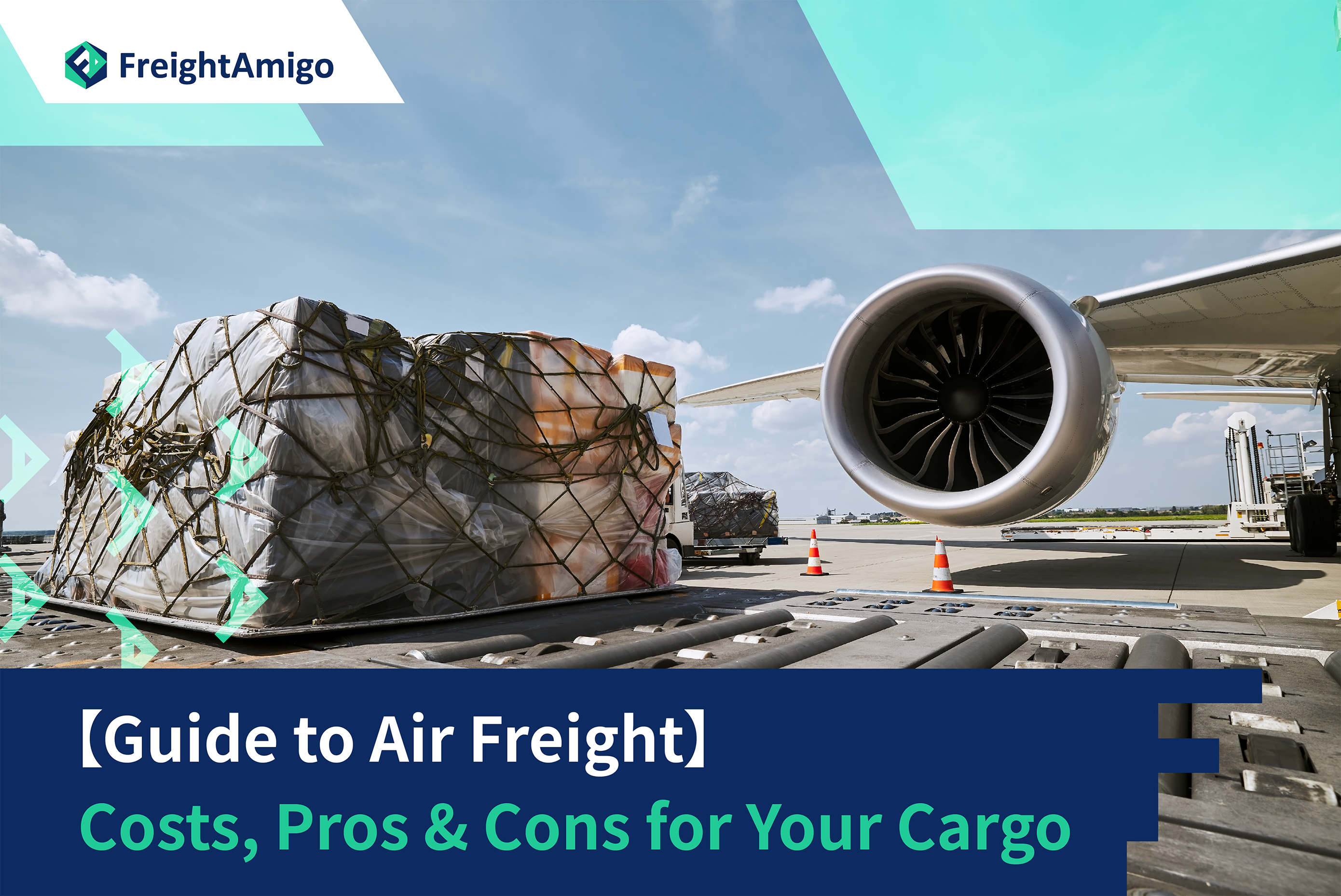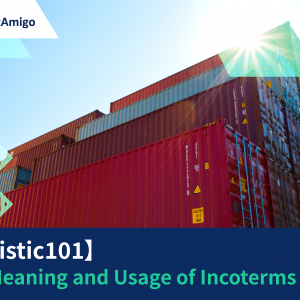Author Name:Tiffany Lee – Marketing Analyst at FreightAmigo
How frequently do you transfer items abroad by air? How well do you understand air freight? This page not only breaks out the cost, rate, cost, etc. of air freight for you but also lists its advantages and suggests products to ship by air. We’ll tell you more about air freight so you can choose the best shipping option.
Want to compare the best Express, Air Freight, Sea Freight, Rail Freight & Trucking rates so as to have better control on cost?
How to determine the international express air freight rate and the cost of air freight per kilogram
When businesses need to transfer their goods swiftly and dependably, importers and exporters all over the world turn to air freight. Despite the fact that 90% of import and export cargo is moved by water, air travel connects the world more quickly, cutting the time required for ocean cargo to go from China to the United States from 20 to 30 days to just three days.
Express air cargo and international air cargo are two different things.
Expedited air freight is typically handled by a single organization, such as DHL, UPS, or FedEx, throughout the entirety of the freight lifecycle, and is delivered door-to-door in less than five days. Expedited air freight typically weighs less than regular air freight (less than one cubic meter, under 200kg).
Foreign air shipments can be bigger and may travel on several carriers. In actuality, the An-225, the largest freighter, can transport a whole train.
Prior to COVID-19, depending on the type of goods and available space, international air freight charges typically varied between $2.50 and $5.00 per kilogram. Due to major disruptions in ocean freight and consumer demand during the start of COVID-19 in February 2020, prices increased dramatically, with airfreight rates rising to between US$4.00 and US$8.00 per kilogram. By early 2023, fees had decreased to roughly $3 to $7 per kilogram, although they were still higher than pre-pandemic rates, most likely because of higher labor and gasoline costs.
Air Freight Rates and Costs
The two main considerations for air freight are weight and volume. Depending on which is more expensive, airlines will bill by volumetric weight (also known as dimensional weight) or actual weight.
The volume of the item (in cubic meters) must be multiplied by 167 to determine the dimensional weight for air shipments. Let’s imagine your package has the following dimensions: Size: 20 cm wide, 20 cm tall, and 20 cm long. This translates to 0.008 volume (the product of all sides divided by one million). To get a volumetric weight of 1.34 kg, multiply this by 167.
The dimensional weight will become the billable weight if it is greater than the actual weight of the product. You can use our chargeable weight calculator for light air shipments to figure out if your shipment will be charged by actual weight or dimensional weight.
Pros of Air Freight
There are three key advantages to air cargo:
- Speed- Around 30 times faster than seagoing ships are airplanes. The slow ocean liner moves at 16–18 mph whereas the airplane speeds at 575 mph. This means that the flight time from the China manufacturing to the American warehouse is merely five days. Make transit time estimates for air freight using this calculator, which is based on recent real shipment data.
- Reliability -With air transportation, there is better tracking and more assurance that your shipment will arrive at the appropriate location and time.
- Protection – When goods are delivered by sea, they are more prone to sustain damage than when they are shipped by air. Because of this, air freight is a smart choice for fragile goods.
Also, air freight offers greater flexibility than marine freight. Daily airline service to key cities worldwide enables more frequent freight and a quicker reaction to changes in consumer demand. Also, compared to ocean freight, air freight requires less packing, saving money and lessening the environmental impact. In general, air freight is quite useful for companies that need to deliver goods rapidly and dependably, especially for expensive or urgently needed things.
Cons of Air Freight
- Cost – As compared to sea freight, air freight is more expensive. In contrast to air freight, which can cost up to $8,000 or more, a medium-sized, 2,000-pound box from Shenzhen, China, to Los Angeles, USA, can be shipped by ocean for $1,500. Yet, because of pricing fluctuations brought on by supply chain disruptions, this gap can be less significant.
- CO2 Emissions- More CO2 emissions are produced by air cargo. According to studies conducted by the UK government, shipping 2 tons of cargo across 5,000 kilometers by sea will result in 150 kg of CO2 emissions, whereas shipping the same amount of cargo by air will result in 6,605 kg of CO2 emissions. Certainly not the greenest method of shipping.
- Heavy Freight -Size and weight are used to determine air freight rates, which can quickly increase costs.
What cargo is recommended to be transported by air?
Because to its high cost, air freight is typically only used for time-sensitive or tiny, high-value shipments, such as:
- Seasonal trends in clothing are quickly changing. As a result, businesses frequently need to move clothes as soon as possible from factories to retailers. Clothing is shipped by air because of its tiny size and high value.
- Pharmaceutical Sector: Medical supplies are frequently flown because of their compact size and high cost.
Samples and Documents: The least expensive means of shipping documents is by air freight. - Seasonal shipments: No matter the product, if there is a strong demand for it internationally and doing so calls for a stronger supply chain, it will typically be sent by air.
Air Freight Charges
The overall cost of shipping by air may include the following in addition to air freight charges based on the above costs:
- Fuel surcharge
- Safety surcharge
- Container Freight Station/Terminal Handling Charges
- Airport transfer fee
In addition, for the cost of door-to-door shipping, the price will also include air cargo services, including:
- Customs agent
- Pickup and Delivery
- Cargo insurance
- Additional fees
Is the price of Air Freight changing
According to Transport Intelligence, the biggest freight forwarders in the globe had moderate growth in international air freight in 2015, at less than 1%. According to the International Air Transport Association (IATA), the growth rate for air cargo was only 1.6% in 2019 compared to 5% in 2014.
The rising reliance on marine freight is one cause of this. Yet, because of the lengthy delays and irregular transit times associated with ocean freight, an increasing number of importers and exporters are switching to air freight.
Due to limited capacity, limits on passenger travel, rising consumer demand, and other pandemic-related variables, air freight fares have doubled since March 2020. On the other hand, air passenger traffic has steadied, creating additional cargo capacity.Yet, because of the lengthy delays and irregular transit times associated with ocean freight, an increasing number of importers and exporters are switching to air freight.
Due to limited capacity, limits on passenger travel, rising consumer demand, and other pandemic-related variables, air freight fares have doubled since March 2020. On the other hand, air passenger traffic has steadied, creating additional cargo capacity. Importers and exporters typically choose to transport by water if time allows, although the cost is still significant.
The majority of global import and export businesses still make every effort to select air freight solely for the most urgent shipments in order to take advantage of cheaper sea freight quotations.
There are different options for cargo transportation. If you want to choose the most convenient and suitable solution, it is best to have the full support of logistics experts! If you are planning to ship goods overseas, please go to the FreightAmigo page for inquiries.
Extended Readings
【Shipping Tips】Hongkong Post’s Types of Postal Services and Restricted items
【Logistic 101 】What are Duties and Taxes
【Logistic 101 】Customs Clearance
If you have any inquiries on logistics/supply chain, feel free to contact FreightAmigo now:
Chat with us online OR
Phone / WhatsApp: +852 28121686









































